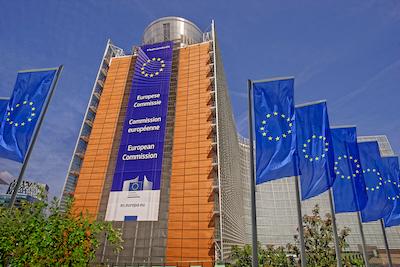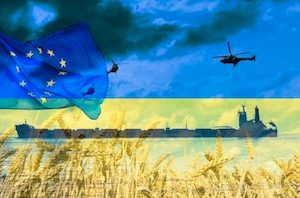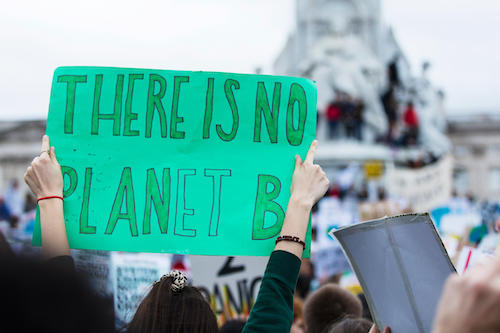The European Union is entering the final stretch of a term overshadowed by the outbreak of a global pandemic and a war on European soil, with Brussels powerbrokers determined to conclude as many files as possible ahead of next June’s elections.
From economic governance to migration, from a new enlargement impetus to the green transition, the clock is ticking for the EU’s decision-makers to reach a deal on key files before a potential political reshuffle following European Parliament elections.
The Parliament has broken down the five dossiers that will dominate the policy agenda after Commission President Ursula von der Leyen has kicked off the rentrée politique with her September state of the union address.
Unlike a year ago, energy will not be the main dish on the policy menu this time. With underground storages filled at a record 90 per cent capacity well ahead of a November deadline set shortly after Russia’s invasion of Ukraine, the 2022 energy crisis appears distant.
Instead, after years of generous spending and relaxed state aid rules, the economic agenda will be back in the spotlight this autumn with the EU halfway through both the bloc’s billion-euro post-Covid recovery plan and its seven-year ordinary budget.
Expect heated negotiations on how to breathe new life into the EU’s strained financial resources, as well as how to develop new common tools to support the bloc’s economy. Ballooning interest rates, meanwhile, are not only putting pressure on Europeans’ wallets; they also mean institutional borrowing costs borne by the EU are on the rise. An evergreen topic has made a comeback against this backdrop and gained renewed political momentum – the quest for a new industrial policy for Europe.
Get your briefing notes (and popcorn) ready: the EU battle has only just begun. Here are 5 key topics to follow this autumn.
Economic governance
The prospect of a recession fuelled by sky-high interest rates in the Eurozone has reinvigorated calls to overhaul the EU’s fiscal framework. Enforcement of the Stability and Growth Pact, the bloc’s public spending rules, was suspended first after the breakout of the Covid-19 pandemic and later in light of the Russian invasion of Ukraine, as EU countries such as Germany dispensed generous state aid to private companies.
But in January of next year, the rules requiring EU countries to keep their public deficit below three per cent and debt below 60 per cent or face financial penalties will again kick into force. That means excessive deficit procedures will be back, though the Commission has offered to give high-debt countries more leeway to meet the targets through tailored plans, allowing them to reduce their public debt over a period of four to seven years. Berlin, along with 10 other hawkish EU capitals, has insisted, however, on automatic, uniform rules applicable to every Member State.
 Photo: Alamy
Photo: Alamy
In a compromise move, the Commission proposed that countries with a deficit-to-GDP ratio of more than three per cent reduce their deficit by at least 0.5 per cent of GDP per year – a plan that has so far failed to garner the support of both the frugal block or the southern European nations. The latter front, led by Italy and France, had instead called for key investments, related for instance to the green transition or defence, to be excluded from the debt calculations.
Time will be of the essence to avoid uncertainty, as the European Central Bank (ECB) warned over the summer that failure to swiftly agree on new rules could have unfavourable effects on Europe’s financial prospects. According to the ECB: “Failure to swiftly agree on and put in place a credible, transparent and predictable fiscal framework could create uncertainty and unduly delay necessary fiscal adjustment and the impetus for reforms and investment.”
EU’s finance ministers will test the waters during a first, informal meeting in Spain on 15 September, but the first real negotiations will take place at the Economic and Financial Affairs Council’s regular October meeting in Luxembourg, ahead of the EU summit taking place in Brussels just a few days later.
Budget
Midway to the end of the current financial cycle, which runs until 2027, Member States will also have to reach unanimous agreement on increasing the EU budget, which finances all EU activities from the flagship Common Agricultural Policy to Erasmus+. Back in June, the European Commission unveiled how it wants to alleviate pressure on the EU spending envelope and increase expenditure ceilings for targeted programmes after multiple crises have drained the bloc’s public coffers.
The executive body’s budget proposal comprised an extra €19bn to cover the rise in interest payments on EU debt; while putting aside €17bn for grants to Ukraine, €15bn for migration management and policies targeted at the EU’s neighbouring countries, and €10bn to strengthen the competitiveness of the bloc’s industrial base, with a view to mobilise up to 15 times as much in private funding.
The latter measure should be seen as part of the bloc’s efforts to keep and attract companies to Europe following the hundreds of billions of dollars in green subsidies with which the United States is trying to attract companies developing clean technologies through its Inflation Reduction Act.
The EU’s executive arm hopes to clinch a deal on its budget proposal by early December, but net payers to the EU’s public coffers such as Germany have so far vocally opposed the Commission’s plea for more cash and insisted on belt-tightening instead. Since the budget proposal would require the unanimous approval of all 27 EU countries, it is unlikely to be passed in its current form.
Ukraine
Eighteen months and 11 EU sanction packages into the war in Ukraine, military aid to Kyiv is set to be a key file on Brussels policymakers’ agendas this autumn. It took the EU institutions a mere three months to approve the Act in Support of Ammunition Production before the summer recess, dedicating €500m in EU funds to rapidly increase the bloc’s production capacity for ammunition and missiles to support both its own and Ukraine’s needs over a 12-month period.
 Illustration: Alamy
Illustration: Alamy
Just before the break, EU foreign policy chief Josep Borrell also unveiled a plan for a more permanent, €20bn fund to provide Ukraine with weapons and ammunition. EU officials are expected to work out the details and the legal basis for this aid over the coming months.
Russia’s invasion of Ukraine also revived discussions around the EU’s long-dormant enlargement policy. Ukraine and Moldova were granted the status of EU candidate countries in June of last year, and Ukrainian president, Volodymyr Zelensky, will be closely monitoring the informal summit of EU leaders to be held in Granada, Spain, on 6 October where a first major strategic debate is set to take place on the enlargement process.
Following the annual enlargement update that the Commission will release that month, accession negotiations with Kyiv and Chişinău are set to be formally opened later in December.
Migration
In June, EU ministers agreed on a breakthrough migration deal after seven years of political wrangling over how to manage the arrival of asylum seekers at EU borders. The Asylum and Migration Pact, the successor to the so-called Dublin regulations, tries to strike a balance between solidarity and responsibility, with EU countries asked to either accept a set number of asylum seekers, or contribute to a pot of EU cash to support the Member States most exposed to migration flows.
It also introduces a new expedited border procedure for those deemed unlikely to win asylum, with the aim of ensuring migrants and refugees remain in the country in which they first arrived.
For the deal to be successful, the EU will need to put fresh money on the table to convince third countries to patrol their borders with the bloc and repatriate alleged ‘irregular migrants’. Previously reached agreements with Tunisia, Libya and Egypt, however, have raised concerns following reports of violence and abuse against migrants by local authorities.
Although a qualified majority suffices for the rules to become law, it remains to be seen whether the EU’s co-legislators will keep their commitment to approve the deal by early 2024, when Belgium will take over the rotating presidency of the EU Council.
With Hungary and Poland next in line to helm the EU body that represents the 27 national governments, the Belgian presidency is considered the last opportunity for the new migration deal to be adopted. Both Hungary and Poland have long opposed any plan that would require EU member countries to share responsibility for migrants arriving at EU shores through resettlement and relocation mechanisms.
Green Deal
Although several dossiers have crossed the finish line, or are close to doing so, the fight around the EU’s ambitious Green Deal climate package is far from over. A broad centre-right alliance of Christian-democrats conservative, nationalist and a few liberal MEPs has shown it has no qualms about watering down or altogether axing some of its most symbolic measures.
 Photo: Alamy
Photo: Alamy
Just before the summer recess, the Nature Restoration Law, a set of binding rules to restore degraded ecosystems, managed to muster enough support, but another contentious file is now on life support. A draft law aimed at drastically curbing the use of pesticides by 2030 as part of efforts to promote sustainable farming practices has attracted opposition from several EU countries as well as the centre-right camp.
They argue the proposal will jeopardise both food security and farmers’ livelihoods. A vote on the law set to take place in the Parliament’s powerful agriculture committee in July has been postponed until October, leading to worries that the proposal will languish there and need to be picked up after the elections and a potential parliamentary reshuffle. Polls suggest, however, that voters will again elect a fragmented Chamber, where an ample coalition of centre-right, liberal and centre-left parties will be needed.
Politics beyond policy
To complicate things further, a busy electoral season at the national level is expected to cast a long shadow over the Brussels policy agenda. No fewer than three EU countries are set to head to the polls in the next three months – Slovakia, Poland and the Netherlands. Depending on their outcome, these elections might alter the composition of the European Council and influence the horse-trading for the top EU jobs that will follow next spring’s elections.
Meanwhile, Spain, in charge of the rotating presidency of the Council until the end of 2023, has tried to project political stability after snap elections in July failed to yield a clear parliamentary majority.
Warsaw’s conservative government, which has been a thorn in the Commission’s side on many issues in general and the rule of law on migration in particular, is expected to remain in power after the Polish elections.
In The Hague, a progressive left-green coalition led by Frans Timmermans – formerly the Commission executive vice-president and Green Deal czar – might shake up Dutch politics, which has been dominated by caretaker prime minister Mark Rutte’s liberal party for the past decade.
Last March, a new populist Farmer Citizen Movement (known by its Dutch acronym BBB) opposed to the EU’s ambitious climate goals and environmental policies, clinched a shock electoral victory during regional elections. With Timmermans, a big fish in the EU pond for the past decade, as the candidate to beat, the green and social agenda will be a prominent feature in the national Dutch debate.
At the same time, however, Brussels is losing the architect of its climate package and one of the most powerful decision-makers in town at a crucial time while talks on the remaining files promise to be difficult.
One thing is clear: we are in for some fun times ahead.
Sign up to The Parliament's weekly newsletter
Every Friday our editorial team goes behind the headlines to offer insight and analysis on the key stories driving the EU agenda. Subscribe for free here.